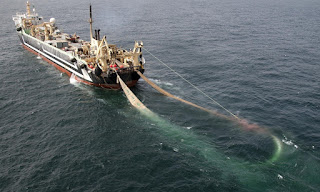Greenpeace petitions UK Government to ban supertrawlers catching 7,000 tons of fish
A YouGov poll, commissioned by Greenpeace, has shown that more than 4 in 5 members of the British public believe supertrawlers, factory trawlers over 100m long, should be banned from fishing in the UK’s Marine Protected Areas. 81% said supertrawlers should be banned from fishing in protected areas, with just 4% saying they should be permitted to fish in them.
This comes after an investigation revealed that supertrawlers spent almost 3000 hours fishing in UK Marine Protected Areas in 2019, more than double the number of hours they spent fishing in UK protected areas in 2018. Marine Protected Areas exist to protect vulnerable ecosystems and marine life, like porpoises and reefs.

The Dutch-owned Annelies Ilena supertrawler in UK waters
A Greenpeace petition calls on the government to ban supertrawlers from protected areas, and has already gathered 125,000 signatures, including those of Sir Michael Palin, Joanna Lumley, Gillian Anderson Green MP Caroline Lucas, Alison Steadman and the explorer Sir Ranulph Fiennes.
“Britain’s departure from the EU’s Common Fisheries Policy is the perfect opportunity to do this. Our government should listen to its constituents, and commit to banning supertrawlers from protected areas as a first step towards designating a network of fully or highly protected MPAs off-limits to all destructive activity across 30% of the UK’s waters.”Britain’s departure from the Common Fisheries Policy will allow the UK government to implement stronger fishing regulations in offshore waters, those beyond 12 nautical miles from the coast. Currently few restrictions are in place in offshore MPAs, which is why supertrawler operations in offshore protected areas are currently legal.
Supertrawler activity in UK waters has increased since 2017. Greenpeace data shows that the UK’s Exclusive Economic Zone was the worst affected by EU supertrawler activity of any on earth in 2018 and 2019, and that the time supertrawlers spent fishing in UK Marine Protected Areas had more than doubled from 1388 hours in 2018 to 2963 hours in 2019.
A Defra spokesman said the UK is a global leader in the fight to protect British seas with the Blue Belt of protected waters that are nearly twice the size of England.
